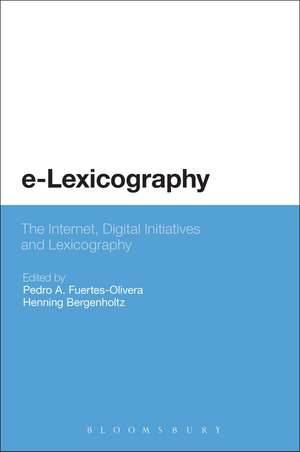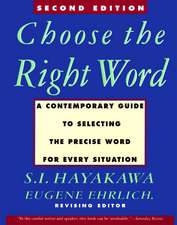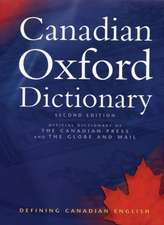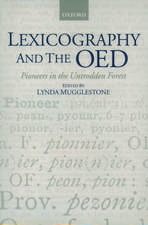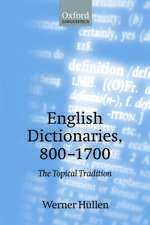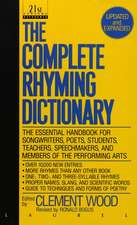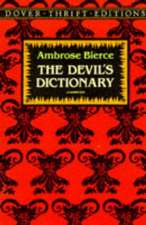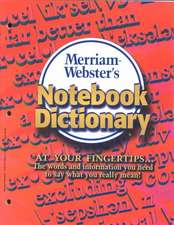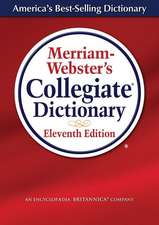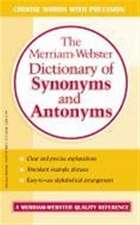e-Lexicography: The Internet, Digital Initiatives and Lexicography
Editat de Pedro A. Fuertes-Olivera, Professor Henning Bergenholtzen Limba Engleză Paperback – 27 mar 2013
Preț: 260.25 lei
Nou
Puncte Express: 390
Preț estimativ în valută:
49.81€ • 51.45$ • 41.45£
49.81€ • 51.45$ • 41.45£
Carte tipărită la comandă
Livrare economică 26 martie-09 aprilie
Preluare comenzi: 021 569.72.76
Specificații
ISBN-13: 9780567194374
ISBN-10: 056719437X
Pagini: 368
Ilustrații: black & white illustrations
Dimensiuni: 156 x 234 x 19 mm
Greutate: 0.5 kg
Editura: Bloomsbury Publishing
Colecția Bloomsbury Academic
Locul publicării:London, United Kingdom
ISBN-10: 056719437X
Pagini: 368
Ilustrații: black & white illustrations
Dimensiuni: 156 x 234 x 19 mm
Greutate: 0.5 kg
Editura: Bloomsbury Publishing
Colecția Bloomsbury Academic
Locul publicării:London, United Kingdom
Caracteristici
Emphasizes the shift from static data repository models to sophisticated and responsive search engines.
Notă biografică
Pedro A. Fuertes-Olivera is an Associate Professor at the University of Valladolid, Spain. Henning Bergenholtz is a Full Professor at the University of Aarhus, Denmark.
Cuprins
Preface Notes on Contributors Introduction: The Construction of Internet Dictionaries Pedro A. Fuertes-Olivera and Henning Bergenholtz1. Learning, Unlearning and Innovation in the Planning of Electronic Dictionaries Rufus H. Gouws 2. Access to and Presentation of Needs-Adapted Data in Monofunctional Internet Dictionaries Henning Bergenholtz 3. Lexicographical and Other e-Tools for Consultation Purposes: Towards the Individualization of Needs Satisfaction Sven Tarp 4. Filtering and Adapting Data and Information in the Online Environment in Response to User Needs Theo Bothma 5. A Multi-layer Architecture for "Pluri-Monofunctional" Dictionaries Dennis Spohr 6. Change of Paradigm: From Linguistics to Information Science and from Dictionaries to Lexicographic Information Tools Patrick Leroyer 7. From Data to Dictionary Sandro Nielsen and Richard Almind 8. Internet Dictionaries for Cognitive and Communicative Functions: El Diccionario Inglés-Español de Contabilidad, Pedro A. Fuertes-Olivera and Marta Niño-Amo 9. A Dictionary is a Tool, a Good Dictionary is a Monofunctional Tool Henning Bergenholtz amd Inger Bergenholtz 10. The Technical Realization of Three Monofunctional Phrasal Verb Dictionaries Birger Andersen and Richard Almind 11. Online Dictionaries of English Robert Lew 12. E-Dictionaries in the Information Age: The Lexical Constellation Model (LCM) and the Definitional Construct, Aquilino Sánchez and Pascual Cantos 13. Modelling Interactive Reading, Translation and Writing Assistants Serge Verlinde 14. Electronic Dictionaries as Tools: Towards an Assessment of Usability Ulrich Heid 15. Conclusions: Ten Key Issues in e-Lexicography for the Future, Eva Samaniego Fernández and Beatriz Pérez Cabello de AlbaReferences Index
Recenzii
This is an excellent collection of papers, which not only represents the state of the art of an emerging new field of "e-Lexicography", but also provides excellent examples of how theory and practice should go hand in hand to build a rigorous new research paradigm.
This book makes abundantly clear that the dictionaries as we know them are indeed a thing of the past. Exciting pointers to the future of our discipline are explored by a string of respected scholars, and unlike similar studies, a serious attempt is made at also embedding the (future) discipline into a theoretical framework. For this reason alone, this book must be on every lexicographer's desk.
All individual contributions are self-contained, with separate Notes/ Websites andmany cross-references to other chapters and with bibliographical referencesintegrated into a combined bibliography... and a useful overall subject index... [the book] has left me quite impressed, and I recommend it to you.
This book makes abundantly clear that the dictionaries as we know them are indeed a thing of the past. Exciting pointers to the future of our discipline are explored by a string of respected scholars, and unlike similar studies, a serious attempt is made at also embedding the (future) discipline into a theoretical framework. For this reason alone, this book must be on every lexicographer's desk.
All individual contributions are self-contained, with separate Notes/ Websites andmany cross-references to other chapters and with bibliographical referencesintegrated into a combined bibliography... and a useful overall subject index... [the book] has left me quite impressed, and I recommend it to you.
